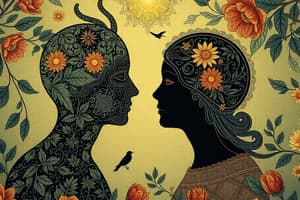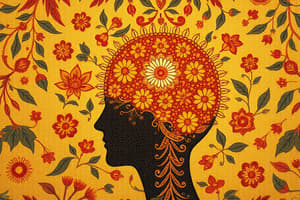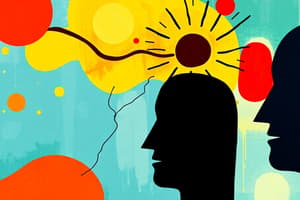Podcast
Questions and Answers
Which approach emphasizes the role of unconscious psychological struggles in shaping behavior?
Which approach emphasizes the role of unconscious psychological struggles in shaping behavior?
- Humanistic approach
- Biological approach
- Psychodynamic approach (correct)
- Cognitive approach
Who established the first research lab in psychology?
Who established the first research lab in psychology?
- B F Skinner
- John B Watson
- Charles Darwin
- Wundt (correct)
What does the behavioral approach focus on?
What does the behavioral approach focus on?
- Mental representation
- Unconscious processes
- Observable behavior (correct)
- Biological influences
Which theory assumes that behavior is shaped by hormones and genes?
Which theory assumes that behavior is shaped by hormones and genes?
Which psychological approach involves natural selection in understanding behavior?
Which psychological approach involves natural selection in understanding behavior?
What does the cognitive approach primarily examine?
What does the cognitive approach primarily examine?
According to the humanistic approach, what primarily drives behavior?
According to the humanistic approach, what primarily drives behavior?
Which psychologist is NOT associated with the behavioral approach?
Which psychologist is NOT associated with the behavioral approach?
What does the arousal theory of motivation suggest about individuals who enjoy rollercoasters?
What does the arousal theory of motivation suggest about individuals who enjoy rollercoasters?
Which statement accurately reflects a difference between bulimia nervosa and anorexia nervosa?
Which statement accurately reflects a difference between bulimia nervosa and anorexia nervosa?
How do biological, social, and cognitive factors affect motivation according to the evolutionary theories?
How do biological, social, and cognitive factors affect motivation according to the evolutionary theories?
What does William James's view of consciousness describe?
What does William James's view of consciousness describe?
Which level of consciousness describes mental activities that are not currently aware but can easily become conscious?
Which level of consciousness describes mental activities that are not currently aware but can easily become conscious?
What is the main function of the endocrine system?
What is the main function of the endocrine system?
Which type of cell in the nervous system is primarily responsible for supporting neuronal function?
Which type of cell in the nervous system is primarily responsible for supporting neuronal function?
What role does GABA play in brain activity?
What role does GABA play in brain activity?
Which part of the brain is considered the oldest?
Which part of the brain is considered the oldest?
What does the somatic nervous system primarily transmit?
What does the somatic nervous system primarily transmit?
What is the process through which sensory messages are given meaning called?
What is the process through which sensory messages are given meaning called?
What hormone does the pituitary gland release to stimulate the adrenal glands?
What hormone does the pituitary gland release to stimulate the adrenal glands?
Which neurotransmitter is noted for potentially causing brain damage during a stroke?
Which neurotransmitter is noted for potentially causing brain damage during a stroke?
What is the first stage of the General Adaptation Syndrome?
What is the first stage of the General Adaptation Syndrome?
Which of the following best describes the 'exhaustion' stage of stress response?
Which of the following best describes the 'exhaustion' stage of stress response?
What role do stress mediators play in the stress process?
What role do stress mediators play in the stress process?
Which of the following reflects a common emotional response to physical stress?
Which of the following reflects a common emotional response to physical stress?
How does overarousal affect cognitive responses during stress?
How does overarousal affect cognitive responses during stress?
According to the Cannon theory, where do emotions originate from?
According to the Cannon theory, where do emotions originate from?
What is the primary association of fear according to the James-Lange theory?
What is the primary association of fear according to the James-Lange theory?
How does the cognitive theory of Schachter-Singer explain emotional experiences?
How does the cognitive theory of Schachter-Singer explain emotional experiences?
What commonality does Darwin attribute to facial expressions of emotions in infants?
What commonality does Darwin attribute to facial expressions of emotions in infants?
What does the term 'autonomic arousal' refer to in the context of the cognitive theory?
What does the term 'autonomic arousal' refer to in the context of the cognitive theory?
According to the James-Lange theory, which of the following is true about emotions?
According to the James-Lange theory, which of the following is true about emotions?
What can influence the emotional label given to an autonomic response according to the cognitive perspective?
What can influence the emotional label given to an autonomic response according to the cognitive perspective?
In the context of emotional communication, which expression did Darwin highlight?
In the context of emotional communication, which expression did Darwin highlight?
Flashcards are hidden until you start studying
Study Notes
### Behaviorism
- John B Watson and B F Skinner are key figures
- Focuses on observable behavior and how it's learned
- Explains behavior through learning principles and environmental stimuli
- Uses operant conditioning
### Evolutionary Approach
- Charles Darwin is the key figure
- Focuses on how behavior and mental processes are the result of evolution through natural selection
### Psychodynamic Approach
- Sigmund Freud is the key figure
- Assumes our behavior is shaped by unconscious psychological struggles.
### Cognitive Approach
- Focuses on how we process information and how it affects our behavior.
- Includes processes such as: perceiving, recalling, deciding, labeling, considering, and executing.
### Humanistic Approach/ Phenomenological Approach
- Assumes behavior is determined by our capacity to choose how we think and act.
- Choices are not driven by instincts or rewards and punishments, but by each individual's perception of the world.
- Abraham Maslow is a key figure.
### Endocrine System
- Glands in the endocrine system communicate via hormones
- The brain has ultimate control over hormone secretion
- The system regulates functions like stress and growth
### Nervous System
- Receives, processes, and transmits information
- Composed of neurons and glial cells
- The peripheral nervous system (PNS) sends sensory information to the central nervous system (CNS).
- The somatic nervous system transmits information from senses to the CNS, and then carries signals to muscles.
- The autonomic nervous system carries messages between the CNS and the heart, lungs, and other organs.
### Neurotransmitters
- Neurotransmitters are communication chemicals used within the human system that affect behavior and mental processes.
- One neuron communicates with another through neurotransmitters crossing the synapse.
- GABA (gamma-aminobutyric acid) is the main neurotransmitter for slowing or inhibiting brain activity.
- A group of neurons using the same neurotransmitter is called a neural pathway or neurotransmitter system.
- Glutamate can cause brain damage during a stroke.
### The Brain
- The brainstem is the oldest part of the brain.
- The hippocampus affects memory, and its shrinkage is linked to Alzheimer's disease.
### Pituitary Gland
- The pituitary gland releases adrenocorticotropic hormone (ACTH), which triggers the release of cortisol from the adrenal glands into the bloodstream.
### Sensation and Perception
- Sensation is the raw information from the senses that affects behavior and mental processes.
- Perception is the process of giving meaning to sensory information.
### Motivation Theories
- Arousal Theory: Suggests that certain people enjoy seeking out intense experiences.
- Evolutionary Theories: Modern versions of instinct theories.
- Incentive Theories: Value of incentives is influenced by biological, social, and cognitive factors.
- Drive Theories: People may continue to eat when full, suggesting biological needs aren't the sole motivator.
- Cognitive Theories: Motivation arises when we perceive a discrepancy between our current situation and our desired situation.
- Maslow's Hierarchy of Needs (revised): Self-actualization is replaced by three other needs: finding a mate, keeping a mate, and becoming a parent.
### Consciousness
- Awareness of external stimuli and our own mental activity.
- Dualism: The mind and brain are distinct entities.
- Materialism: The mind and brain are one and the same.
- Theatre View: Consciousness is a single phenomenon, like a stage.
- Parallel Distributed Processing: Consciousness is processed in many parallel streams of information.
- Stream of Consciousness: Consciousness is a continuous flow.
- Conscious Level: Mental activities we are aware of.
- Non-Conscious Level: Mental activity inaccessible to conscious awareness.
- Pre-Conscious Level: Mental activity not currently conscious but can easily become so.
### Emotions
- Theories of Emotion:
- Cannon-Bard: Emotions are generated by the brain.
- James-Lange: Emotions are created by awareness of physiological responses.
- Cognitive-Schachter-Singer/Lazarus: Emotional experiences are shaped by cognitive interpretations of events and physiological reactions.
### Communicating Emotions
- Darwin's Theory of Emotion: Facial expressions are universal and play a role in health.
### Stress
- Refers to internal processes when people adjust to challenging situations.
- Stressors: Events that trigger stress.
- Stress Mediators: Factors that influence how we cope with stressors.
- Stress Responses: Physical and psychological reactions to stress.
### General Adaptation Syndrome (GAS)
- A three-stage pattern of response to stress.
- Alarm: Fight or flight response.
- Resistance: The body adapts to the stressor.
- Exhaustion: The body's resources become depleted.
### Stress Responses
- Physical: GAS
- Emotional: Stress commonly triggers emotional responses.
- Cognitive: Cognitive processes may be impaired by stress.
- Behavioral: Stress often manifests in physical behaviors.
Studying That Suits You
Use AI to generate personalized quizzes and flashcards to suit your learning preferences.




